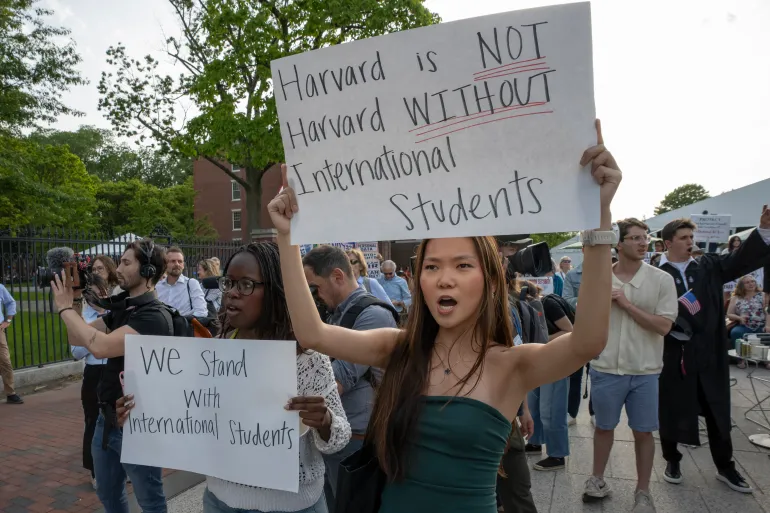In a decision creating waves across the global education sector, the U.S. State Department has temporarily paused new student visa interviews at embassies and consulates worldwide. This move aligns with the Trump administration’s plan to introduce enhanced social media vetting for applicants seeking F, M, and J visas — primarily international students and exchange visitors.
Why the U.S. Paused Student Visa Interviews
According to Politico, Secretary of State Marco Rubio authorized this temporary freeze on May 27, 2025. The policy mandates that no new visa appointments be scheduled until embassies receive updated screening protocols for evaluating social media histories. Scheduled interviews will proceed, but new applicants face indefinite delays.
The new guidelines will reportedly include a comprehensive review of social media activity for signs of political activism, affiliations, or posts deemed risky from a security standpoint.
Impacts on International Students
For students across Asia, Africa, the Middle East, and Latin America, this policy shift has already caused significant concern. Many have received admission offers, scholarships, or program placements from U.S. institutions — only to find their visa interviews indefinitely postponed.
According to Time Magazine, international students fear being denied entry based on misunderstood online content. Posts made years ago — sometimes out of context — may be flagged, leading to rejections or prolonged background checks.
The policy also risks pushing students to seek alternative education destinations like Canada, the UK, Australia, or Germany — countries perceived as more welcoming to international scholars.
Economic and Academic Consequences for U.S. Universities
This abrupt policy has stirred concern among U.S. higher education institutions. International students contribute over $44 billion annually to the American economy, according to the U.S. Department of Commerce. They help subsidize tuition, support research, and bring global diversity to campuses.
Schools like Harvard, MIT, and Stanford have built extensive global reputations based on attracting top academic talent from abroad. Now, they face reduced enrollments, financial strains, and reputational risks.
Additionally, legal tensions are escalating. The Trump administration recently tried to revoke student visa privileges for Harvard University, citing student-led protests and alleged political activism. A federal judge has since blocked that attempt — but the message is clear: student policies may be wielded as political tools. (CBS News)
Privacy, Free Speech, and Political Ramifications
Critics argue this move is part of a broader crackdown on dissent. The Guardian reports that the social media screening plan appears to target students involved in pro-Palestinian movements and anti-war protests.
Civil liberties groups warn that vetting based on online speech could violate free expression rights. In some cases, liking a controversial post or following a political account could be flagged as grounds for denial.
Additionally, this policy may create a chilling effect — discouraging students from engaging in political discourse online for fear of visa denial.
What Can Students and Institutions Do?
If you’re an international student affected by this situation, consider the following:
- Monitor embassy websites: Stay updated on local U.S. embassy announcements for visa scheduling resumption.
- Contact your university: Many institutions are offering support services and may allow online start dates until visas are processed.
- Review social media accounts: Remove or clarify posts that could be misinterpreted.
- Explore alternative destinations: Canada, the UK, and Australia are already seeing increased interest due to the U.S. policy shift.
Conclusion
The U.S. pause on student visa interviews and its forthcoming expansion of social media vetting could reshape the global landscape for higher education. While proponents argue it enhances national security, critics fear it undermines American values of openness, academic freedom, and merit-based immigration.
As this policy unfolds, it will be vital to balance security interests with the rights and aspirations of thousands of students who view the U.S. as the land of opportunity.
For ongoing updates, you can follow coverage from Time, BBC News, and Boundless Immigration.

